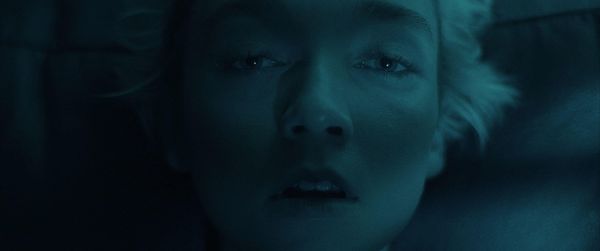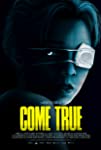Eye For Film >> Movies >> Come True (2020) Film Review
Come True
Reviewed by: Jennie Kermode

Sleep paralysis is a fascinating phenomenon which manifests in strangely similar ways around the world. It's often terrifying to those who experience it and this is not the first horror film it has inspired. Highly stylised as it is, though, this is a film that's likely to linger in the memory - and perhaps make its way into dreams - and although it's a low budget effort with pacing problems and a disappointing ending, it has some smart observations to make.
Our protagonist is Sarah (Julia Sarah Stone), who signs up to participate in a sleep study for the simple reason that she needs somewhere to sleep. Anyone who has been homeless will recognise straight away the particular kind of fatigue that she displays before the experiment begins, as well as understanding her reluctance to talk about it, and there's a well observed prologue which illustrates her efforts to find safe places in the city where she lives, to catch a few hours' rest. This creates an obvious power imbalance between her and the researchers which becomes problematic when one of them, Jeremy (Landon Liboiron), starts flirting with her. The degree to which she ends up giving in to him will doubtless seem inappropriate to some viewers - and, perhaps, romantic to others - but it reflects a common reality for people in her situation, who generally come to accept the exchanges that they need to make in order to survive.
As if this weren't enough to have to deal with, the experiment - as you might have guessed - entails its own set of problems. Sarah's longed-for sleep is interrupted by nightmares. After being shown an image captured from one of her dreams, she experiences a serious and unexpected reaction. Not completely powerless, she uses her connection with Jeremy to find out more about the nature of the research, but could that knowledge be dangerous in itself? Something seems to be stalking her in her dreams, and by the time Jeremy - who has secret troubles of his own - decides that he wants to try and save her, it may already be too late.
Writer/director/cinematographer Anthony Scott Burns shoots with low colour saturation. The videos of the sleepers, and the images extracted from their dreams (a real life technique still in the early stages of development) are in black and white, and as the story unfolds the saturation in the main scenes is slowly adjusted so that we slide further into the unconscious realm. Burns presents us with a disturbing vision of alienness which mirrors the sense of alienation one can experience as a homeless person on the fringes of a society which believes that everyone lives in the same way. There's a sense of discomfort and otherness which pervades the film.
Although the film falls short in other ways, these qualities, together with the excellent central performance, make it well worth watching. It will leave you keen to see more from Burns and Stone in future - and, perhaps, a little bit wary about closing your eyes.
Reviewed on: 10 Mar 2021
















